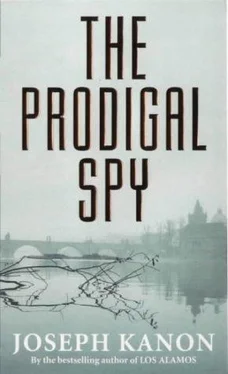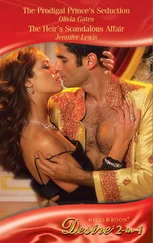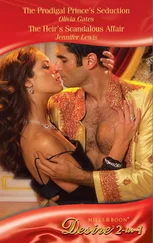“Excuse me,” a girl behind him said, holding out her card. “Do you have any idea how to pronounce this?”
An American voice. He looked at her-long blond hair held away from her face by an Indian headband, shoulders draped with a patterned gaucho cape-and took the card.
“Hue,” he said automatically, wondering why she’d asked. She was pretty but slightly drawn, dressed to look younger than she was. Had she been standing there all this time?
“No, the name. I mean, he’s dead-awful if I couldn’t pronounce it. I mean-”
Nick looked again at the card. “Trochazka,” he read.
“Chaw?” she said, drawing out the flat a. “Like that? Russian?”
“No, it’s a Czech name.”
“Really? Do you know that?”
Nick shrugged. “It’s a common name. Smith. Jones. Like that.”
“Common if you’re Czech,” she said. “Are you?”
Nick shook his head. “Grandmother.”
“You take it, then. I’ll never say it right. Swap, okay? Do you mind?”
Nick smiled. “Be my guest,” he said, handing her his card. He watched her face as she read it, did a double-take, and then gave a wry smile.
“Okay, you win. I can’t even start this one. Is this like Jones too?”
“No. Che-chin-ski,” he pronounced. “Polish.”
“You can tell? Just like that?”
“Well, the ‘ski’ is Polish. The rest, I don’t know. I’m just guessing.”
She looked at him and smiled. “I’m impressed.” She reached over and took back her card, grazing his fingers. “Forget the swap, though. I think I was better off the first time. Imagine, two in a row. Maybe we’re the Slavic section. How do you say yours? In Czech. Z’s and y’s and all that?”
“Warren.”
“Oh.” She smiled. “Sorry.”
“No,” he said, studying her face, her quick brown eyes meeting his without embarrassment. “They’re funny names.”
“But not to them. I know. Mine’s Chisholm, by the way. With an l.”
“Imagine what the Poles would do with that.”
She smiled. “Yes, imagine.”
He looked at her again. Wide mouth and pale skin, a trace of freckles over the bridge of her nose.
“Where are you from?” she said, the usual American-abroad question.
“New York.”
“No, I mean where here. Are you with a group?”
“LSE,” Nick said.
“You’re a student?”
He laughed at her surprise. “Too old?”
“Well, the tie-” He followed her eyes to the senior-tutor wool jacket and plain tie he’d forgotten he had on. “Are you a teacher?”
“No, I’m finishing a dissertation,” he said, the all-purpose explanation for his time away, the drift. “Late start. What about you?”
“Oh, I’m-just here.” She looked away for a second, avoiding him, and adjusted the heavy bag hanging from her shoulder, a shapeless but good soft leadier that seemed at odds with the hippie cape. When she turned back, he was still staring at her. “What?” she said.
“Nothing,” he said, catching himself. “I was-never mind.”
“What?” she said, a laugh now in her throat.
“Well, I was going to say, Do you come here often? And I realized how dumb it sounded. What I meant was, have you been to one of these before?” But what he really meant was, why are you here? He wondered if she was like the girls in Hair, floating in a haze of smoke between protest marches and concerts, interchangeable parts of the same scene. But she was looking at him again with the same frank scrutiny, anything but mindless.
“Of course,” she said simply. “I don’t understand people who don’t.”
“Even over here?” Nick said, his own doubt.
She shrugged. “It all counts. Somehow. Why do you?”
“Same reason, I guess,” he said, letting it drop.
The line moved a little now, people drawing nearer to the steps where the speakers had appeared, and he began to move with it.
“So do you always wear a tie?” she said, trying to keep his attention.
He smiled. Was she flirting with him? “I have to meet somebody after,” he said. “That’s all. Tie people.”
She looked up at him and squinted her eyes. “Tie people?”
“Parents.”
“Parents?” she said, disconcerted.
“Am I too old for that too?”
She looked at him oddly, as if his answer had thrown her, a piece from the wrong puzzle. “They live here?” she said unexpectedly.
He shook his head. “Flying visit. One meal. One tie. Not too much to ask.” He glanced at his watch, reminded of the time. Larry and his mother were expecting him in just under an hour. “What’s the matter?”
“Nothing. I-”
She seemed flustered again, but now there was a movement in the crowd, and before she could finish, people began to surge politely around them, looking down the street.
“It’s her!” someone shouted. “She came.”
Nick glanced toward the corner, where a black taxi idled as a tall woman leaned in to pay the fare. Two women with her greeted the organizers and collected their index cards, then steered her away from the photographers who had begun to move in their direction. “Miss Redgrave, over here!” She was dressed in a plain pea coat with a long muffler wrapped around her neck as camouflage, but in her high boots she towered over the other marchers, drawing attention like camera light. Now the rally had point.
She ignored the commotion at the steps and quietly joined the line not far from Nick, thanking the students who moved aside to make a place. They nodded shyly, pretending to be indifferent, but it was a face they had seen twenty feet high and soon they were staring openly, sprinkled with the same fairy dust that drew the press.
“Can you give us a statement?” one of the reporters shouted, Cockney and insistent.
“No, sorry,” she said, turning away and staring straight ahead, removing herself.
“And will you be speaking today?” he asked quickly.
One of the women with her waved an arm to take in the crowd. “We’re all speaking today,” she said. “Just by being here.” The students around her nodded, flattered.
Nick wondered who she was. An actress he didn’t recognize? Or a hanger-on, the willing mouthpiece?
“What about charges that demos like these are actually undermining the progress of the Paris peace talks?”
“What progress?”
“Right,” he said, smiling, finally jotting something down. “Film stars in politics?”
“Come on, Davey, not again,” the woman said, surprising Nick with the intimacy. Had they been around this dance floor before? Maybe she was famous, part of the new culture that seemed to have sprung up overnight, while he wasn’t looking, a music without history. “Everyone’s in politics,” she said, almost offhandedly. “Whether they want to be or not.”
“Even the dead, eh? These soldiers here,” he said, nodding toward the index cards. “Think they’d be pleased? Being part of this?”
There was a question, Nick thought. He wasn’t even sure how he felt, still alive.
“We honor them as victims, not soldiers,” the woman said, then stopped, aware that the reporter was writing. “That’s all now, please.”
And, surprisingly, it was. The reporter, still scribbling, nodded and started to back away, apparently satisfied with an interview that hadn’t really happened. Nick remembered the reporters in Vietnam taking the handouts from the press office, knowing they were lies, printing them anyway.
“Davey’s all right,” the woman now said busily to Redgrave, who seemed not to hear, her Valkyrie head still above the crowd.
The line continued to press from behind, drawn to limelight, and Nick felt himself pushed against the girl at his side.
Читать дальше












